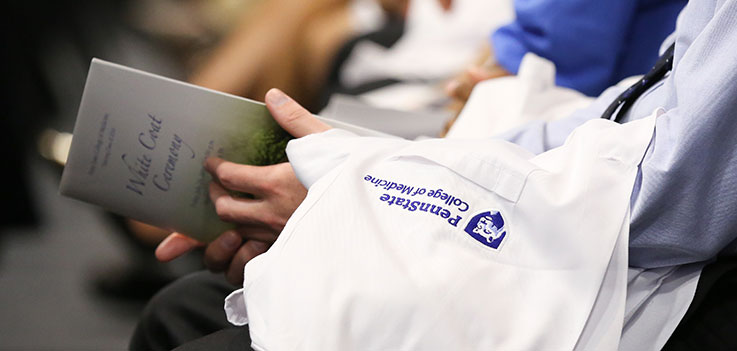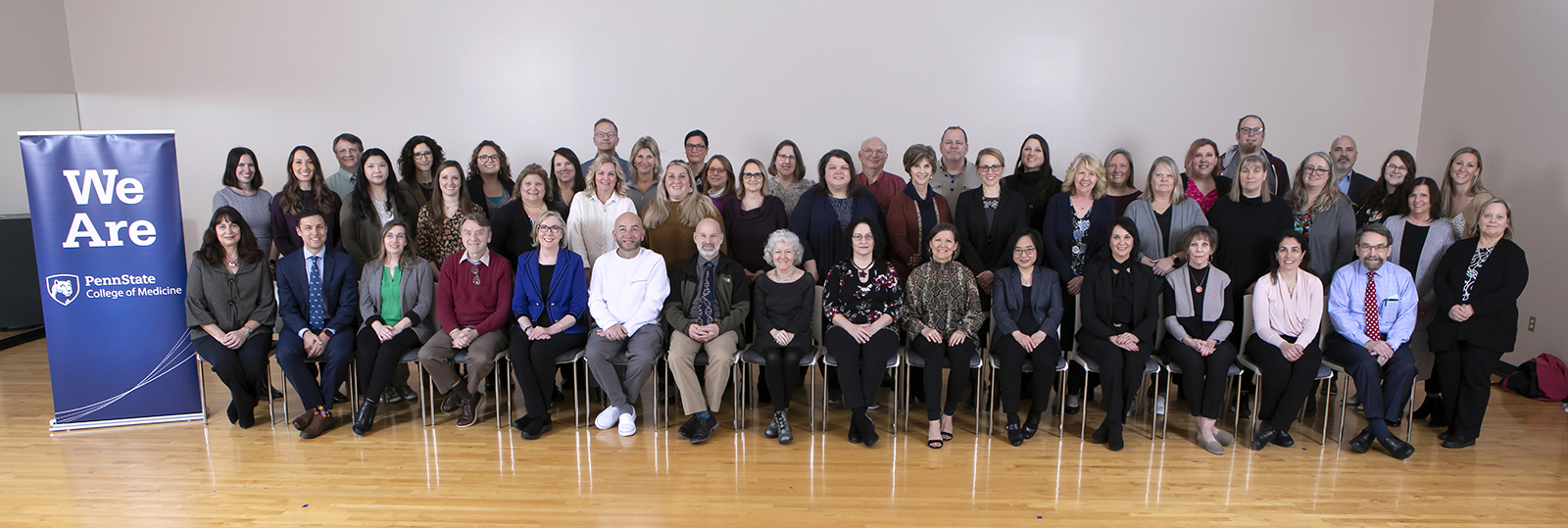Offices and Contacts

MD Program Offices and Staff
Office of the Vice Dean for Educational Affairs

Units reporting to the Vice Dean for Educational Affairs.
Office of Medical Education (Hershey and University Park)
The Office of Medical Education is led by a accomplished team of deans, directors, and staff members who are dedicated to their roles. They are responsible for overseeing the creation of curricular content and providing digital resources to enhance teaching for faculty members and learning for students. Additionally, they carefully evaluate educational outcomes through a thorough course and clerkship assessment program. The office also offers resources to help faculty members improve their skills as medical educators. Financial and administrative oversight, as well as education research resources, ensure that academic programs receive strong support.
Student Admissions
The Office of Medical Student Admissions oversees the application process of approximately 11,000 applicants, of which about 8,500 are screened for consideration for a personal, virtual interview – that number ending up being about 800. There are 5 subcommittees that review all application components of each interviewed applicant, including the assessments of our Screeners and Interviewers, making offers of admission that yield an Entering Class of about 152 new medical students each year. Other special programs, communication with applicants and advisors, maintaining informational resources, and other tasks round out the work of the office.
Graduate Medical Education
The Office of Graduate Medical Education oversees the 73 ACGME-accredited residency and fellowship programs within Penn State Health and supports their program directors, program coordinators, clinical chairs and trainees. The office serves as the central location for information, services and support related to trainee employment and serves as the personnel office for trainees. The GME Teams provides the services below:
- Support to the clinical chairs, program directors, program coordinators and chief residents on a variety of issues, projects and activities
- Help using the New Innovations program
- GME-wide well-being initiatives
- Help with Pennsylvania State Board of Medicine training and unrestricted PA licensing
- Help with loan deferments and loan forbearance
- Verification of residency or fellowship training
Harrell Health Sciences Library
The Harrell Health Sciences Library: Research and Learning Commons is central to the provision of biomedical information resources and expertise in support of the education, research, patient care, and community outreach missions of the Penn State College of Medicine. Resources include:
- 24/7 access to the library space
- Dedicated quiet study area
- Small group study rooms
- Printing, scanning and copying
- Technology Sandbox and One Button Studio
- Access to all Penn State University Libraries resources
Continuing Education
Penn State College of Medicine is accredited with commendation by the Accreditation Council for Continuing Medical Education (ACCME). This is the highest level of recognition in the accreditation process.
The Office of Continuing Education in the College of Medicine works to extend the academic expertise of the organization’s clinical and basic sciences, as well as professional skills in leadership, teaching, and research.
The office’s portfolio comprises content that assists physicians and other health care professionals to continue lifelong learning and improve their competence and performance, with the goal of improving patient outcomes.
Goals of the office are:
- Extend the academic expertise of Penn State Health’s clinical and basic sciences by disseminating research and knowledge on prevention, treatment and practice to help improve patient outcomes.
- Provide accredited continuing medical education for internal and external audiences based on identified needs and practice gaps.
- Respond to requests from external health care professionals, agencies and organizations.
- Collaborate with organizations to deliver educational initiatives for a national audience.
Office of Evaluation and Assessment
The Office of Evaluation and Assessment (OEA) oversees all testing and assessment activities for Undergraduate Medical Education, including development, IT infrastructure, proctoring, and support. OEA facilitates and tracks assessment of medical school competencies, sub-competencies and milestones required of graduating medical students, and work with the University Park curriculum to comparable learner outcomes. This office oversees program evaluation data collection for the College of Medicine and helps to implement processes for continuous quality improvement, in compliance with new and evolving accreditation requirements.
Program on Human Structure
The Education Program on Human Structure is responsible for everything relating to anatomy education, willed-body donation, the anatomy lab (MDL), and ultrasound education for the medical, physician assistant, and graduate students. The Penn State anatomy graduate students and faculty are an integral part of Human Structures and are involved in teaching students of all levels (high school through medical residents). The lab regularly hosts advanced training events for residents, nurses, fellows, attending physicains, and allied health professionals. The willed body program supports all of our in-house sessions and supplies numerous regional medical schools and universities.
Finance Shared Services and Office of Student Aid
The Finance Shared Services Team for Educational Affairs oversees the purchasing and budget oversight for Undergraduate Medical Education. Additionally, the team oversees the processing of purchase orders, contracts, reimbursements and all other related finance activities for all the offices under Educational Affairs. Requests and inquiries can be sent to the MEDEDpurch@pennstatehealth.psu.edu inbox for assistance.
Student Affairs
The Office of Student Affairs serves to empower our learners to reach their fullest potential in all aspects of their curricular and co-curricular engagements. We actively provide guidance to enrich the future experiences of our learners in:
- Career advising
- Personal and professional coaching
- Development of leadership and team building skills
- Advocacy, active listening, and unconditional support
- Promoting health and wellness
- Celebrating growth, accomplishments, and milestones
Medical Student Research
The Medical Student Research (MSR) program gives each medical student an opportunity to participate in mentored medical research. Students gain an understanding of the research process, limitations and variability of data, and an application of research to clinical practice. Projects may be in the clinical, social or basic medical sciences and may be conducted on campus or at off-campus sites, nationally or internationally.
Office of Health Systems Science
The Health Systems Science (HSS) office is a vital link between the missions of Penn State College of Medicine and Penn State Health. The organizations' vision is to become a recognized leader in using HSS to power healthcare delivery so that all may “master and design rather than cope with and fight systems in which we care for patients.”
Since 2014, more than 1,300 medical students, 100 physician assistant students, 20 chaplain residents, 100 resident physicians and nearly 200 faculty and staff at Penn State Health have been educated in the principles of health systems science. The organization has been awarded over $2.5 million in grant funds and contributed to the publication of four textbooks that are now used in medical schools nationwide. Finally, in an effort to always keep patients first and foremost in mind, the College of Medicine and Penn State Health have established a program for medical students to work directly with patients to address healthcare inequities and social determinants of health from day one of medical school – a program that has now impacted over 4,300 patient lives.
Global Health
The Office of Global Health offers a unique four-year curriculum, known as the Global Health & Health Equity Pathway (GHHEP), designed for 1st year medical students passionate about community health interventions and research with underserved populations, both locally and internationally. Throughout the program, students engage in two-month-long service learning experiences in domestic or international settings to gain practical experience in the field.
PA Program
The PA Program Office provides support to currently enrolled students in the didactic and clinical years of the PA program, aides prospective students through their admission and enrollment to the program, and remains a resource for program alumni. Members of the PA Program faculty and staff include administrative support, an admissions specialist, data analyst and accreditation manager, clinical coordinators, full-time principal faculty, part-time faculty, the medical director, and the program director.
Woodward Center for Excellence in Health Sciences Education
The mission of the Woodward Center is to cultivate excellence in Health Sciences Education. The Woodward Center offers a variety of programs designed to improve health sciences education and recognize great educators at Penn State College of Medicine, including workshops, colloquia, peer observation and feedback of teaching, education awards, and health sciences education scholarship grants. The Woodward Center sponsors EdVenture, the College of Medicine’s annual celebration of Teaching and Learning. The center is funded through a generous gift from the estate of Grace Woodward, a longtime friend of Penn State University.
